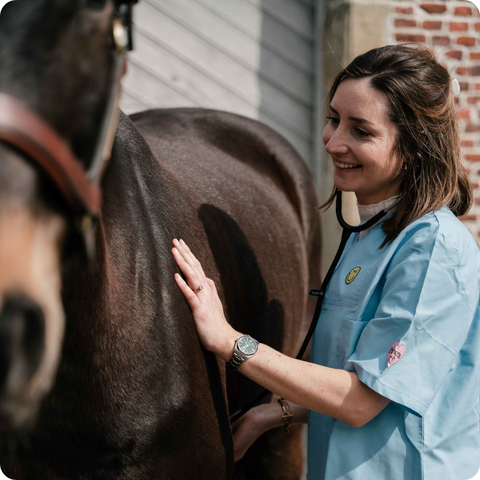There is nothing more adorable than a newborn foal - though it may take some searching before you get to that point. Infertility is a frustrating and complex problem, one with quite a few possible causes. Luckily, there are a number of things you can do to give your mare (and her future foal) a helping hand.
This is how you treat an infertile mare
1. Treat underlying problems
Underlying problems will affect your mare’s general health. Have your mare examined and tackle any medical problems in consultation with your vet. Your vet will try to correct any anatomic abnormalities and usually treat any infections with antibiotics.
Is your horse suffering from a disease like laminitis, equine metabolic syndrome, or arthritis? If so, you must treat the condition and the pain before you have your mare covered.
2. Create an optimal environment
Increase the chances of a successful pregnancy by giving your mare’s stable a thorough going-over. Pay particular attention to her feed and accommodation.
Do make sure that your mare gets enough exercise because she shouldn’t be overweight (or underweight for that matter). Expose her to as little stress as possible and preferably allow her to have contact with other horses.
3. Adjust your mare’s diet — prior to, during and post gestation
The correct diet is crucial to mares in foal
Preferably give her access to a paddock because grass contains important nutrients - both for your mare and her embryo. If you only feed her roughage your mare won’t get enough minerals, vitamin E or proteins.
Proteins are essential for the foal’s growing cells and body tissues, especially during the final months of gestation and also during lactation.
Mind: even though your mare is in foal, there is no need to stuff her with extra feed either. If she’s in good condition, simply give her her normal feed during the first eight months of gestation.
Your mare’s nutritional requirements won’t increase until the final three months of pregnancy because that’s when the foal will experience a serious growth spurt.
There are plenty of concentrated feeds around that will meet a pregnant mare’s increased energy requirements.
You can also boost your mare’s energy levels by feeding her vegetable oils as they are far healthier than increased amounts of sugar.
There are also a number of natural vitamins and ingredients that will have a positive impact on your mare’s fertility.
-
A vitamin E deficiency will affect your mare’s fertility and lead to malformation of the foal (white muscle disease) or abortion. So, make sure to give your horse plenty of natural vitamin E — during lactation included because this nutrient produces antibodies in the milk, thereby boosting the foal’s immunity (1, 2).
-
Broccoli is rich in indol-3-carbinol, which has a positive impact on the hormone system and the health of the endometrium (3, 4).
-
Folic acid, vitamin B12, choline and betaine have a positive effect on your mare’s fertility and on the development of her foal. The same goes for cysteine, a building block for the powerful antioxidant glutathione (5-8).
-
Linseed balances your horse’s hormones and has a positive effect on fertility, in mares and stallions alike (9).
Can't wait for a cute little foal of your own and determined to give your mare extra support? Improve the health of the endometrium with Fresh & Fertile. Start administering three months before her covering date and continue until the first trimester.
To boost your horse’s energy levels, offer her Grow & Glow, which contains the best plant-based omega-3 fatty acids (DHA from microalgae). Start during the final three months of gestation and continue all through lactation. We wish you every success!
Scientific references
-
Peugnet P, et al. Management of the pregnant mare and long-term consequences on the offspring. Theriogenology. 2016;86(1):99-109.
-
Bondo T, Jensen SK. Administration of RRR-α-tocopherol to pregnant mares stimulates maternal IgG and IgM production in colostrum and enhances vitamin E and IgM status in foals. J Anim Physiol Anim Nutr (Berl). 2011;95(2):214-222.
-
Fowke JH, et al. Brassica Vegetable Consumption Shifts Estrogen Metabolism in Healthy Postmenopausal Women. Vol 9.; 2000.
-
Valente Pereira FM, et al. Influence of temperature and ontogeny on the levels of glucosinolates in broccoli (Brassica oleracea var. italica) sprouts and their effect on the induction of mammalian phase 2 enzymes. J Agric Food Chem. 2002;50(21):6239-6244.
-
Waterland RA, et al. Methyl donor supplementation prevents transgenerational amplification of obesity. Int J Obes. 2008;32(9):1373-1379.
-
Swegen A, et al. From Peptide Masses to Pregnancy Maintenance: A Comprehensive Proteomic Analysis of The Early Equine Embryo Secretome, Blastocoel Fluid, and Capsule. Proteomics. 2017;17(17-18):1-13.
-
Ebisch IMW, et al. Homocysteine, glutathione and related thiols affect fertility parameters in the (sub)fertile couple. Hum Reprod. 2006;21(7):1725-1733.
-
Sinclair KD, et al. DNA methylation, insulin resistance, and blood pressure in offspring determined by maternal periconceptional B vitamin and methionine status. Proc Natl Acad Sci U S A. 2007;104(49):19351-19356.
-
Samavat H, Kurzer M. Estrogen Metabolism and Breast Cancer Hamed. Cancer Lett. 2015;28(356):231-243.




